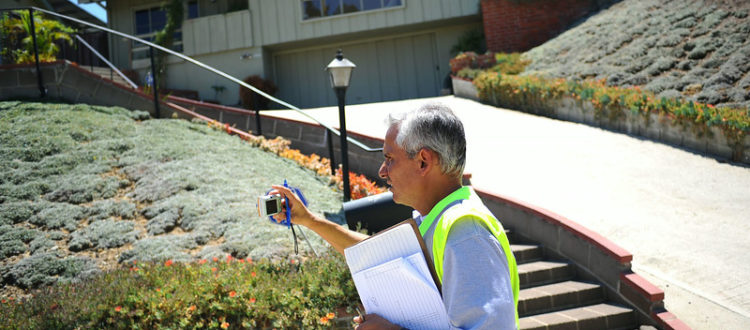Drought buster patrols the streets of Los Angeles
Published on July 18th, 2014
Dana Bartholomew
July 16, 2014
Los Angeles Daily News
A day after state water regulators voted to get tougher on water restrictions, the Los Angeles water police Wednesday were out in force — with a full-time water cop of one.
But until he gets three more water enforcement deputies next month, Rick Silva has the herculean task of patrolling 500 square miles of illegally watered lawns, driveways and restaurant water glasses by himself.
“Only full-time water cop, soon to change,” said Silva, supervisor of the LADWP’s Water Conservation Response Unit, after a one-man hunt for water scofflaws on an afternoon near downtown. “Everything has changed with the drought.
“We’re upping our enforcement. We’re getting more staff. And we’re going to start issuing more tickets.”
With California now in its third year of the worst drought in decades, the state Water Resources Control Board on Tuesday approved fines of up to $500 a day for people who waste water washing cars, watering lawns, spritzing driveways and filling fountains.
The urban restrictions could slake the thirst of 3.5 million residents a year, according to regulators. In California, three-quarters of available water is used by farmers.
But while Southern California cities from Long Beach to Santa Barbara have long had mandatory water restrictions, water use along the coast has soared 8 percent. And in Los Angeles — a leader in water conservation — water use has jumped 5 percent since last year despite penalties of up to $600.
Seven years ago, the Department of Water and Power revived its famous Drought Busters to break water wasting scofflaws. Then it cut back its six water cops, once quick to issue tickets and fines to residential and commercial profligates.
Then came Silva and his newly renamed Water Conservation Response Unit. But instead of tickets, he has aimed to coax compliance through conservation education. Of the 30,000 complaints of potential violators since 2009, 9,000 were mailed written warnings with only 300 residents handed fines.
That may change with a DWP announcement Tuesday to hire three more water conservation deputies in two weeks.
“This week, I do feel overwhelmed. I wish we had more staff,” said Silva, navigating his official Honda into the hills of Silver Lake. “Within three weeks, me and my staff will likely be writing tickets.”
Like a human divining rod, the 54-year-old water conservation expert who once helped hand out a million free low-water toilets spots a puddle in front of a hillside home, a stream beneath a newly landscaped yard and a river from beneath an ivy wall — all signs of illicit off-hour and off-day watering.
At each successive house, he issues a gentle warning in lieu of a written violation, which would come before any future fine. He sees himself as a conservation educator, not a water cop. One complaint at a time, one house at a time, one homeowner at a time … across a city of roughly 4 million residents.
“For us, it’s not about being heavy-handed,” Silva said. “It’s about education, eliciting a change. People know it’s a drought: If they know better, they’ll comply.”
Five years ago, Los Angeles instituted mandatory water conservation, which restricted outdoor watering and prohibited certain uses of water. The restrictions include barring residents from watering on certain hours and days to hosing down driveways and sidewalks.
Restaurants also must ask diners if they want water before offering them a glass — a rule that is frequently violated. Anyone wishing to report water waste can contact 800-DIAL-DWP or WaterConservationResponseUnit%40ladwp.com.
With Los Angeles just having recorded its lowest rainfall for two consecutive years the entire Golden State in severe drought, the long-term weather forecast isn’t good. The El Niño condition expected to bring rain this fall has weakened — which could mean a fourth year of lingering drought, forecasters say.
“The West and Southwest are definitely on the ropes,” said Southland water expert Bill Patzert, climatologist for the Jet Propulsion Laboratory in Pasadena. “There is no fix for this drought. It will take years of above-average rainfall to recover and dramatic restrictions on water usage to maintain California’s economy.”
Some say the worst water scofflaws are those who can afford it. With water use soaring on the well-heeled coast, the wealthier communities look like “rainforests,” they say, while the remainder begins to look more withered.
“In addition to the red and blue politics, we’ll have the green coast and brown inland,” said Steve Erie, outgoing director of the Urban Studies and Planning Program at UC San Diego. “Even with the price (of water) going up, the wealthy along the coast will continue to use it.”
For that reason, critics say it’s not enough for a few DWP water police to rein in watering. Public shaming through old-time whistle-blowing and social media must come into play.
“If you can legislate conservation and don’t enforce it, then you’ve a prototype toothless tiger,” Patzert said. “We should use social media to rat out our water wasting … instead of ‘selfies,’ we can do ‘yardies’ and post them on the DWP website.”
“This is a new mission for Neighborhood Watch,” Erie added about beefing up awareness.





